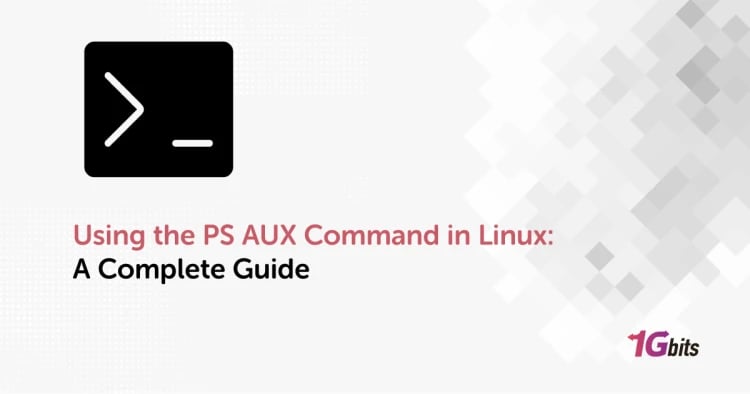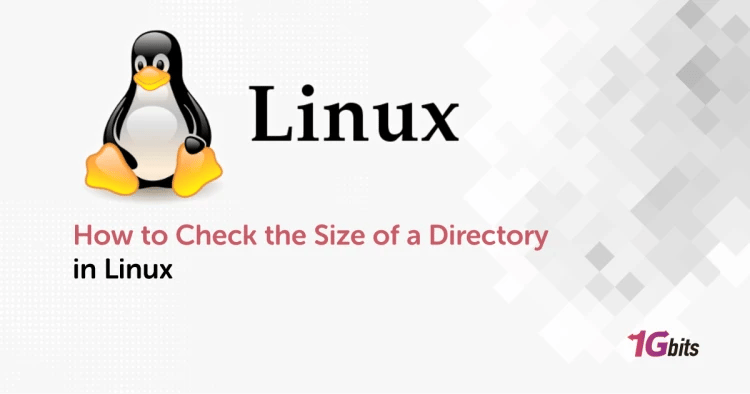Embarking on the journey of mastering Best Linux Tutorial Sources can be both exciting and daunting, especially with the abundance of learning resources available. Whether you are a beginner seeking foundational knowledge or an experienced user aiming to enhance your skills, the diverse array of Linux tutorials scattered across the web can make the selection process challenging. In this exploration of Linux learning materials, we will navigate through the best resource to learn Linux that offers comprehensive guides, tutorials, and courses. From renowned online platforms to curated tutorials by industry experts, this article aims to provide a curated list of valuable resources to assist individuals in their quest to become proficient in Linux.
For those looking to keep their Linux systems up-to-date, don't miss our guide on how to update Linux. Staying current with system updates is essential for maintaining security, stability, and access to the latest features, making it a crucial skill for any Linux user.
Best Linux Tutorial Sources Free and Premium
Explore the best Linux resources, both free and premium, to elevate your skills and knowledge. From foundational basics to advanced techniques, discover the best Linux tutorial sources that cater to learners at every level:
For those interested in diving deeper into specific Linux distributions, check out our guide on What is Linux Fedora to understand its unique features and benefits.
1. Compute Freely:
Explore the benefits of Linux and make the leap from Windows with the user-friendly platform, Compute Freely. This website is one of the best Linux tutorial sources and designed for individuals with minimal or no prior experience with Linux, providing a straightforward introduction without delving too deeply into technical details. Using plain and concise language, Compute Freely outlines the advantages of adopting an open-source operating system, introduces various popular Linux distributions, and recommends alternatives to Windows applications. It's the perfect resource for those looking to transition to Linux seamlessly.
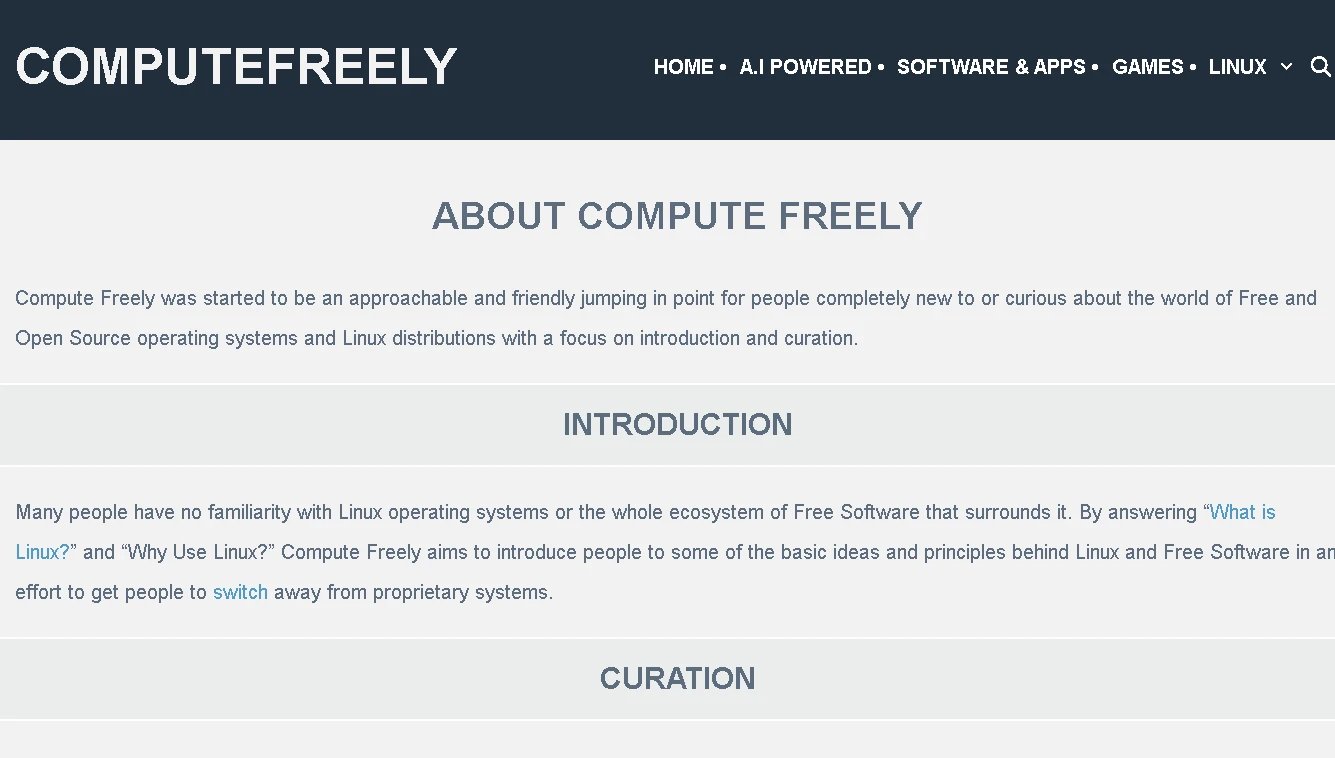
2. The Ultimate Linux Newbie Guide:
As the title suggests, The Ultimate Linux Newbie Guide is tailor-made for beginners, offering a straightforward and uncluttered website for quick Linux tutorial. Whether you prefer to skip to specific chapters or follow the content sequentially, this guide walks you through the installation of a Linux distribution and offers valuable tips and tutorials for integrating Linux into your daily routine. Although concise, the guide covers essential concepts and provides the best way to learn Linux for beginners on their inaugural Linux distribution.
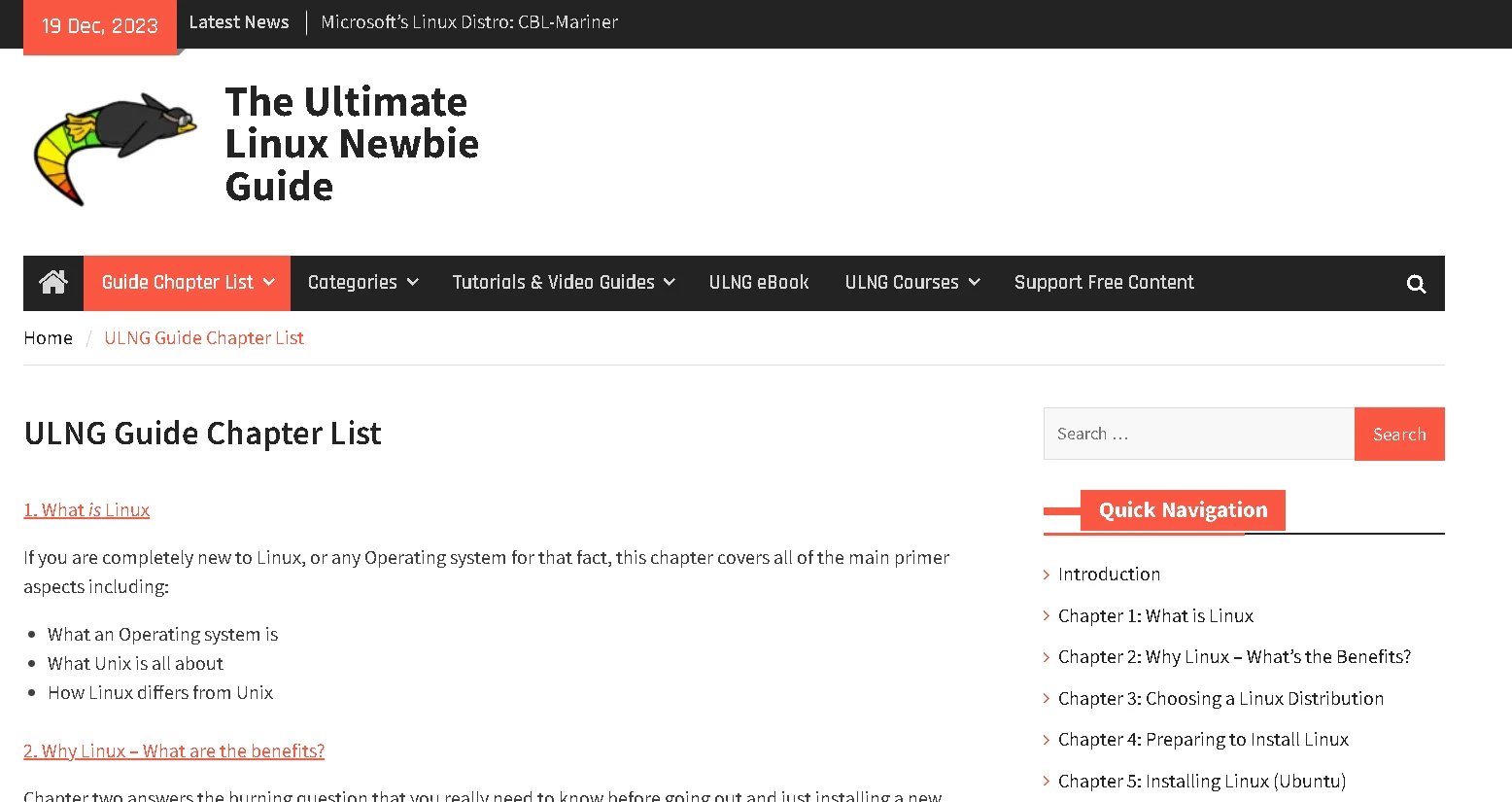
3. Distribution-Specific Guides:
openSUSE Leap Guide
Among the best Linux tutorial sources, this unofficial guide to openSUSE Leap 42.1 adeptly explores the fundamentals of Linux. It provides compelling reasons for transitioning to Linux, offers a brief overview of frequently used terminal commands, and delves into the installation, setup, and maintenance of the Leap distribution. Whether you're a seasoned openSUSE user or a newcomer, this guide proves equally valuable.
Link: http://opensuse-guide.org
Arch Linux Wiki – Beginner’s Guide
Here is the best way to learn Linux Ubuntu. Renowned for its advanced nature, Arch Linux becomes more accessible with the Beginner’s Guide on the Arch Linux Wiki. Despite being recognized as one of the more challenging distributions to install and manage, Arch Linux boasts the best-documented resources. The wiki's beginner’s guide simplifies the installation process and offers an extensive list of system management tips and recommended applications applicable not only to Arch but also to other distributions.
Link: https://wiki.archlinux.org/index.php/Beginners%27_guide
Ubuntu Help
Catering to the extensive user base of beginners, Ubuntu provides accessible and detailed documentation. Official desktop guides for all supported versions are available for download, but the community wiki stands out as a treasure trove. Organized by topics, the wiki offers detailed step-by-step tutorials on hardware setup, networking problem-solving, and computer security. Much of the advice is applicable to Ubuntu derivatives, making it a valuable resource for users of Linux Mint and Elementary OS, among others.
Link: https://help.ubuntu.com/
The Debian Administrator’s Handbook
A respected resource for those aspiring to become Linux system administrators or enhance their Linux knowledge, The Debian Administrator’s Handbook covers everything Debian-related. From installation and packaging to troubleshooting, server setup, and network management, this book is available for free online reading or download. Donations to support this valuable project are encouraged.
Link: https://debian-handbook.info/about-the-book/
RHEL Online Documentation
Targeting users building a serious career in Linux, Red Hat Enterprise Linux (RHEL) offers a fantastic online documentation system. This comprehensive resource covers system administration, power management, Linux security, and guidance on setting up and maintaining Linux servers. The documentation's thorough explanation of Linux system theory, applications, services, and processes is applicable across various Linux distributions, making it a valuable asset for general Linux knowledge enhancement. Articles can be downloaded as PDF and ePub for offline reference.
Link: https://access.redhat.com/documentation/en/red-hat-enterprise-linux/
4. Master the Linux Command Line: Essential Commands [Free]:
Unlock the power of the Linux command line with this outstanding tutorial. The command line is an invaluable tool for programmers and developers, providing a gateway to explore technologies like Ruby on Rails, Django, Unix customization, and much more.
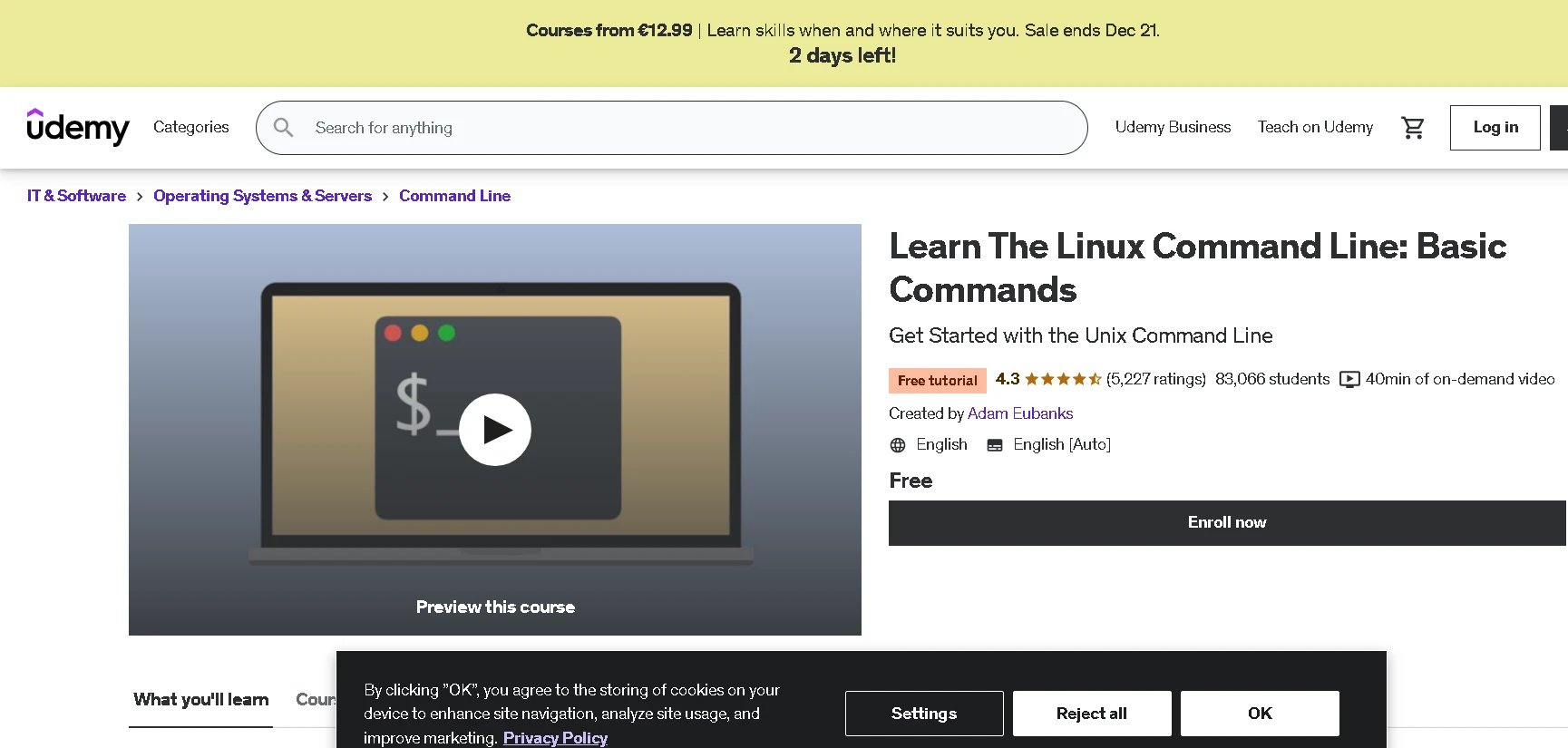
To join the course, simply follow this link: Basic Commands on the Linux Command Line. The curriculum covers a broad spectrum of fundamental Linux commands, spanning file management, process control, system administration, and beyond.
While the command line training is tailored for Linux users, Mac users can also reap benefits, albeit with some differences. For newcomers, the command line might initially seem daunting and intricate, making self-study challenging. This course addresses that hurdle, providing a structured approach to learning and demystifying the command line.
5. Free Ubuntu Course on Linux Tutorials and Projects by Udemy:
Explore another outstanding free Ubuntu course, crafted by an industry veteran with over 25 years of experience. Jason Cannon, whose IT journey began as a Unix and Linux System Engineer in the late 1990s, shares real-world Ubuntu expertise in this comprehensive offering.
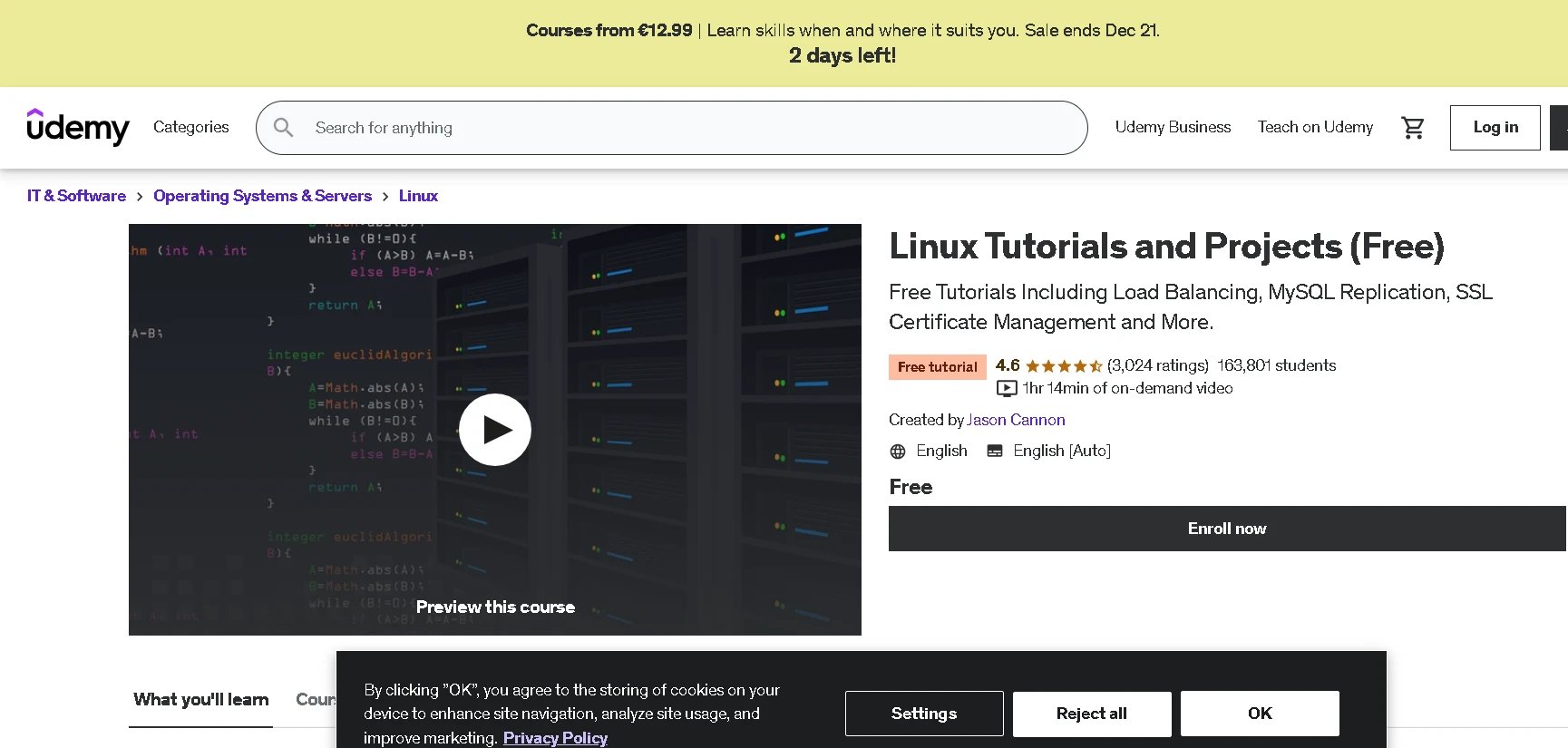
Throughout the course, you'll delve into practical skills such as setting up an SSL certificate on CentOS Linux and Apache, mastering the intricacies of load balancing HTTP and web traffic using Nginx, and establishing MySQL Master-Slave Replication on Ubuntu Linux.
Engage in hands-on exercises that not only introduce you to Linux but also instill the confidence to tackle real-world systems. Jason Cannon's wealth of experience brings a practical edge to your learning journey.
Link: Here
6. Explore Linux Learning on Udemy:
When it comes to expanding my knowledge, Udemy is a preferred platform, offering a vast array of best Linux tutorial sources covering diverse subjects, including Linux. With the most extensive collection of best Linux tutorial sources – both free and paid – Udemy serves as a superior alternative to YouTube, providing a more structured and organized learning experience.
While numerous Linux resources are available, not all are worth your time, and constant course hopping can impede your learning progress. To streamline your learning journey, here's a curated list of the best free Linux courses on Udemy to kickstart your Linux education:
- Red Hat Enterprise Linux Technical Overview [Free]
- Linux Tutorials and Projects [Free]
- Intro to Linux Shell Scripting [Free course]
These exceptional free Linux courses cover essential topics such as Linux commands, shell scripting, and fundamental Linux concepts, ensuring a solid foundation for learners.
For those seeking a more comprehensive learning experience, consider the "Linux Mastery: Master the Linux Command Line in 11.5 Hours" course by Ziyad Yehia on Udemy. Though not free, at $10, it's a highly affordable investment considering the significance of Linux and the valuable skills you'll acquire.
7. Discover Free Linux Courses on Coursera:
In the realm of valuable online resources, Coursera stands out as a prominent platform. Curating online courses and programs from top-tier universities, companies, and educational institutions, Coursera provides a diverse array of learning opportunities. Many of the courses available on Coursera are free, and there are several noteworthy options for those interested in learning Linux.
Explore these excellent free courses on Coursera:
- Fundamentals of Red Hat Enterprise Linux
- Linux for Developers
- Linux Server Management and Security
- Linux Tools for Developers
These courses are presented by reputable organizations and universities, including RedHat, the Linux Foundation, and the University of Colorado.
It's important to note that while you can access Coursera courses for free to enhance your learning, fees may apply if you choose to obtain a certificate or enroll in a specialization or professional degree program.
8. IBM's Learn Linux 101: A Path to LPIC Certification:
Have you come across LPIC? In case you haven't, let us give you a quick overview: LPIC is a certification program for Linux users, administered by the Linux Professional Institute. Functioning like other professional certifications, it entails passing a test to validate your skills and earn a certificate that can significantly boost your career. With multiple levels of certification, LPIC is a crucial step in establishing a Linux sysadmin career and is often a prerequisite for various tech job positions.
Consider expanding your learning journey with IBM's Learn Linux 101: A Path to LPIC Certification. This comprehensive resource provides foundational knowledge for Linux beginners and aligns closely with LPIC certification topics, making it an ideal starting point for those aiming to achieve this credential.
So, why are we sharing this information? Despite the exam's cost, the documentation and materials for the LPIC exam are accessible online, and some are even available for free. IBM's developerWorks hosts a series of tutorials named "Learn Linux, 101," specifically designed to prepare you for the first level of LPIC.
However, this valuable resource isn't limited to exam preparation; it's an excellent way to learn about Linux independently. The topics are systematically organized into numbered sections, covering essential Linux activities such as installation, package management, terminal commands, setting up display managers, printer and network configuration, and more. Each lesson is enriched with examples and accompanied by relevant links to deepen your understanding. Additionally, most lessons can be downloaded as PDF files for offline reference.
9. DigitalOcean Guides for Linux Enthusiasts:
DigitalOcean offers a wealth of top-notch tutorials, predominantly focusing on advanced topics. Their "Getting Started with Linux" series serves as a concise yet comprehensive tutorial, guiding users from the basics of the terminal and file management to more advanced actions like handling file permissions and redirecting input and output. While not designed for complete beginners, this guide caters to users eager to delve deeper into Linux system administration and programming.
DigitalOcean's tutorial repository extends beyond the basics, covering topics such as managing Linux processes and services, setting up and securing servers, and much more. Users can easily navigate through the tutorials using the search field or by exploring the list, sortable by date and popularity.
This collection represents just a modest sampling of the myriad Linux learning resources available online. Numerous high-quality courses, tutorials, and books exist, providing learners the flexibility to choose resources that align with their preferences and pace of learning. Importantly, Linux education transcends the English language, offering free instructional materials in various languages. Exercise caution by assessing the reliability of your sources, refraining from executing commands in the terminal if unsure, and relying only on resources deemed trustworthy.
For those looking to expand their Linux knowledge with practical, cloud-focused tutorials, the DigitalOcean Guides for Linux Enthusiasts offers an excellent resource hub. It covers essential skills and advanced topics to support users at any level in their Linux journey.
Explore our comprehensive tutorial for a full guide on “How to use Linux: a full guide”, covering everything from basic commands to advanced system management.
3 Best Linux Tutorial for Beginners on Youtube
Navigating the vast sea of YouTube channels dedicated to the best Linux tutorial source can be challenging. Fear not! We've assembled a compilation of the top ten channels of best Linux tutorial sources that will guide you on your journey to mastering Linux.
10. Joseph Delgadillo:
Joseph Delgadillo's YouTube channel is an excellent resource for delving into Linux, information technology, and network security. The videos provide clear, concise explanations, and Delgadillo's articulate voice ensures easy comprehension. This channel also explores IT and hacking development, programming, and computer security. In essence, if you seek knowledge on Linux or information technology, this channel is your go-to. With 326 videos, it covers not only technical subjects but also delves into philosophy, psychology, and self-improvement, making it a diverse learning hub.
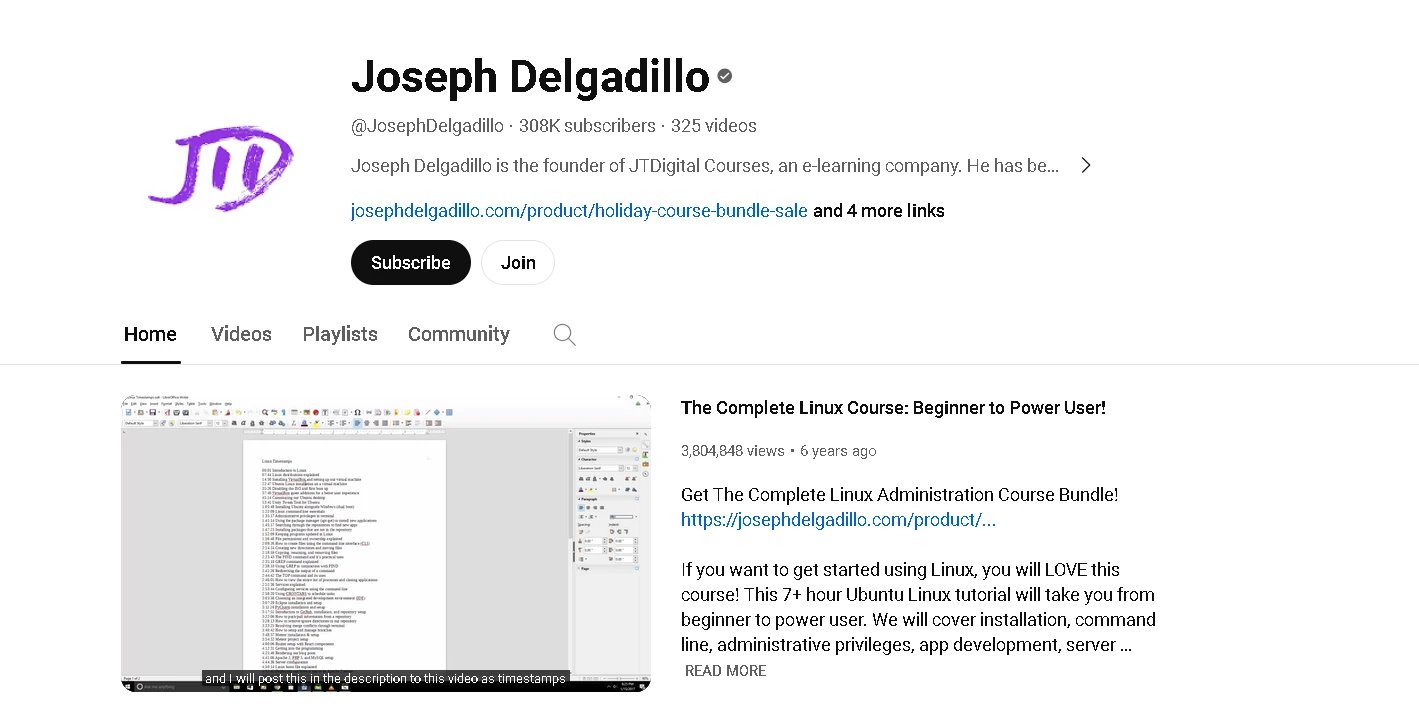
11. The HackerSploit:
The HackerSploit YouTube channel caters to beginners, offering a plethora of videos on Kali Linux tutorial youtube, penetration testing tools, and ethical hacking. Tailored tutorials guide users through installing and using Kali Linux, complemented by a dedicated penetration testing course. Boasting over 452 videos, the channel continually adds content, ensuring its audience stays well-informed. For those intrigued by ethical hacking and penetration testing, the HackerSploit channel is a valuable resource, providing a wealth of information and well-produced videos.
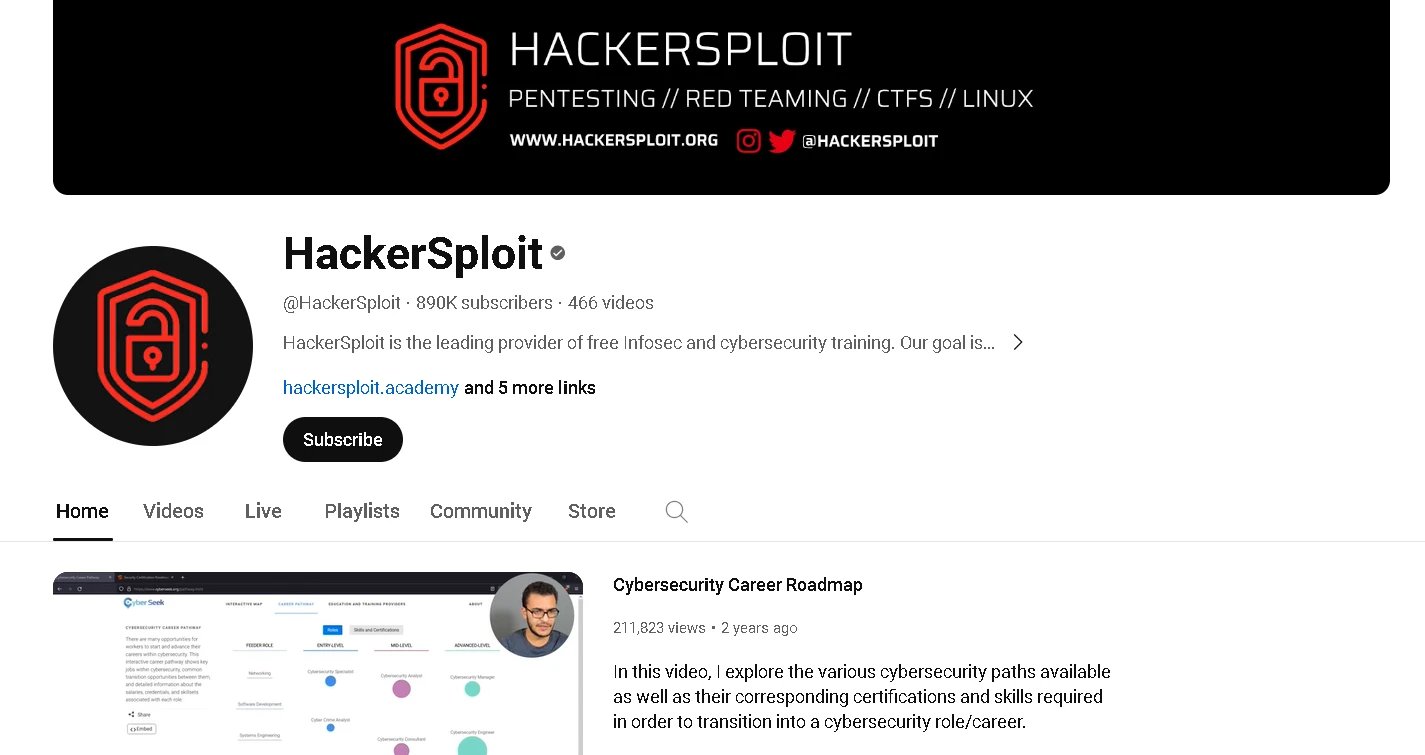
12. LinuxHint
LinuxHint's YouTube channel is one of the best Linux tutorial sources on YouTube and a valuable asset for those keen on mastering Linux and computer science. Featuring a diverse array of videos on topics like Linux programming and commands, the channel caters to both beginners and experienced users. Whether you're looking to enhance your Linux skills or stay abreast of the latest in computer science, the LinuxHint channel is a must-visit resource.
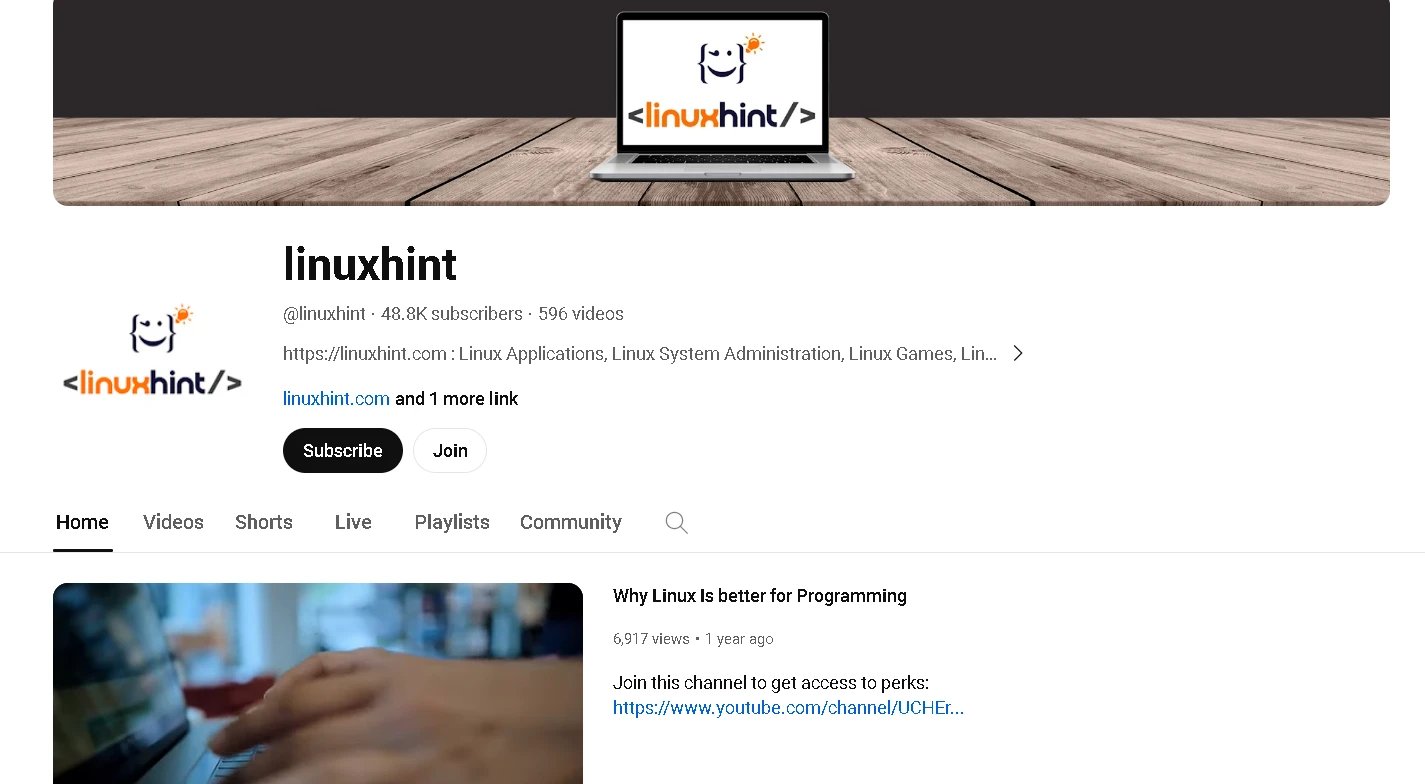
Enhance your hosting experience with the superior performance of a Linux VPS—explore our offerings and Buy Linux VPS for unparalleled reliability and flexibility.
Final Words
In conclusion, the world of best Linux tutorial sources offers a vast array of resources catering to learners of all levels. From foundational tutorials to advanced courses of Linux best tutorial, the diverse sources explored in this guide aim to empower individuals with the knowledge and skills needed to navigate the Linux landscape with confidence. Remember that the key lies in selecting among these best Linux tutorial sources aligned with your learning style and pace. As you embark on your Linux learning journey, continually assess the reliability of your chosen sources, exercise caution when implementing commands, and leverage the wealth of information available to build a strong foundation in Linux. With commitment and the right guidance, you'll find yourself not only mastering Linux but also unlocking a world of possibilities in the realm of open-source computing. Happy learning!
For those ready to apply their Linux skills in a practical environment, consider exploring the best Linux VPS options for hands-on experience. A reliable Linux VPS can be an excellent platform to practice commands, manage a server, and deepen your understanding of Linux in a real-world setting.
People also read:
- How to Install SearchSploit on Kali Linux?
- Linux Features that everyone should know!
- Nano, Linux Command-Line Text Editor
- How to disable root Login in Linux
- Linux Commands to Check CPU Information







